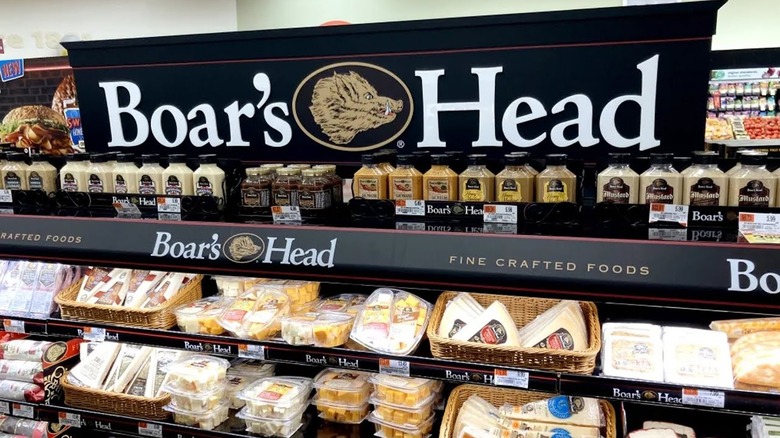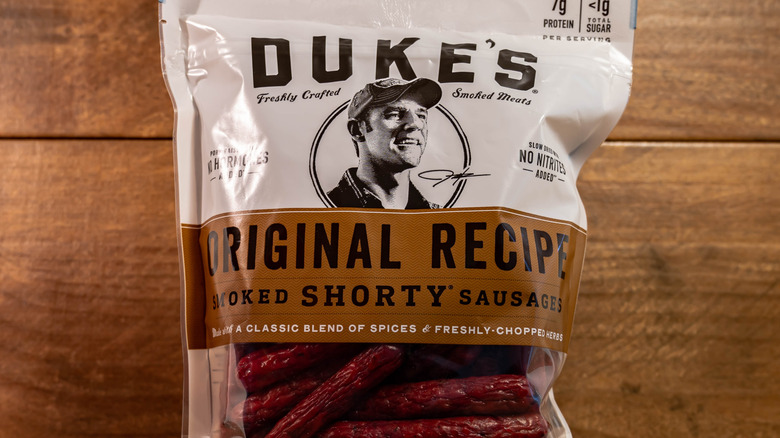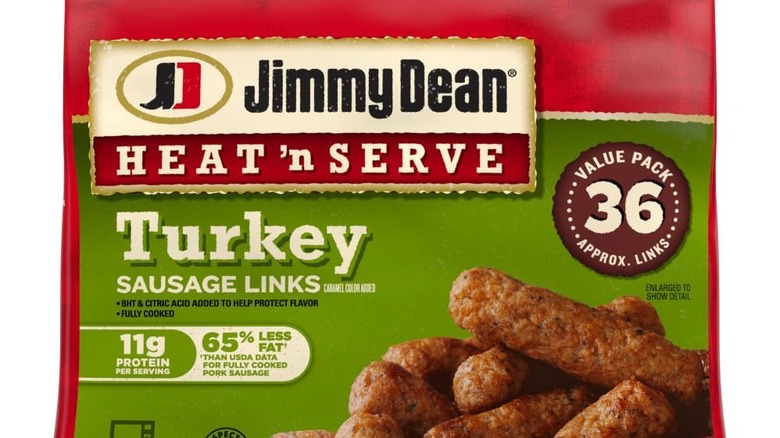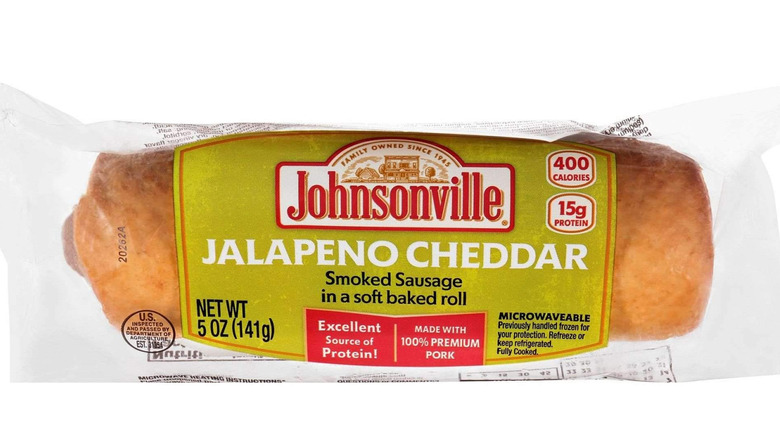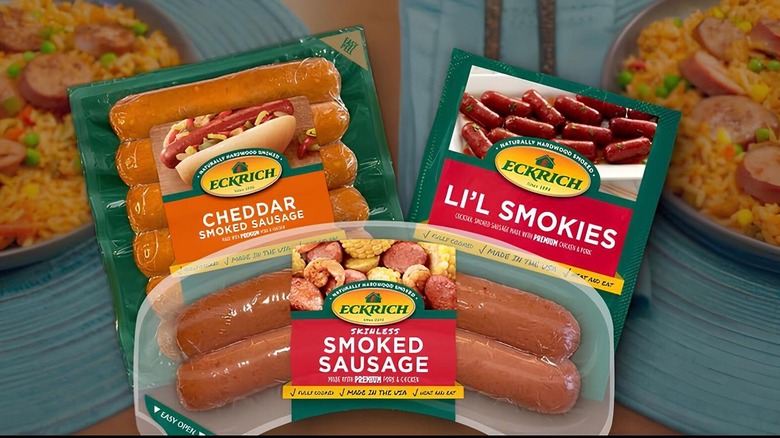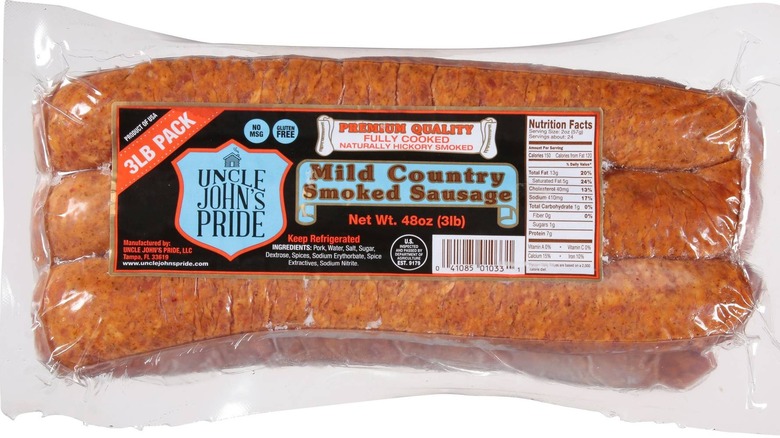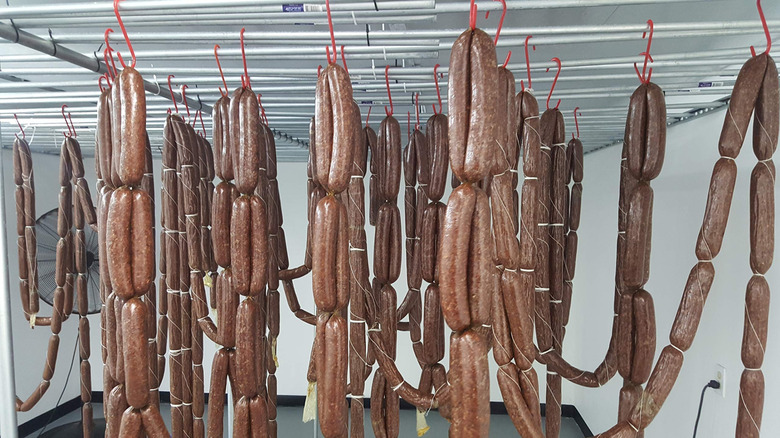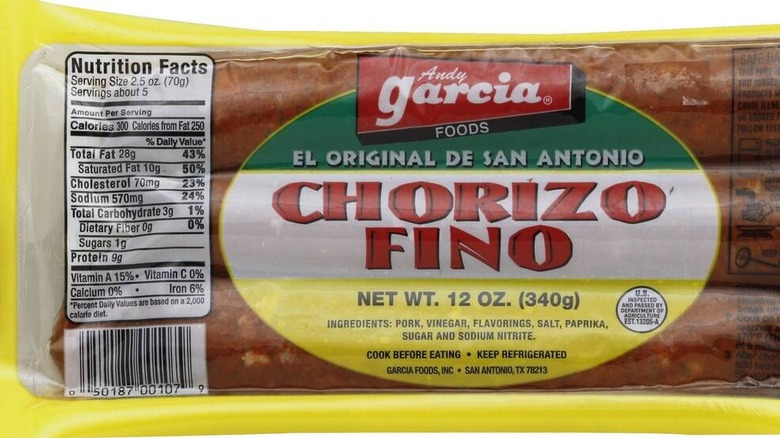The Biggest Sausage Recalls Ever
We may receive a commission on purchases made from links.
Sausage: It's everywhere, and for good reason. Whether it's sizzling on a backyard grill, anchoring a hearty breakfast, or bringing people together at sausage festivals like Wisconsin's Bratwurst Days, this culinary staple is endlessly flexible and right at home anywhere.
But sometimes, sausage is best left off your plate. The Centers for Disease Control and Prevention (CDC) estimates that foodborne illnesses sicken a whopping 48 million people in the United States annually, and meat products, including sausage, contribute significantly to this disease burden.
From contamination with dangerous bacteria like listeria and foreign materials such as metal and plastic to undeclared allergens, not every link on your plate is as safe as it is delicious. It's no wonder, then, that sausage has been involved in some of the worst food recalls over the years, with some incidents involving nearly a million pounds of product. Below, we'll dive into some of the biggest sausage recalls in U.S. history, revealing some of the reasons why your favorite links were abruptly wiped off the shelves.
Boar's Head: Liverwurst (2024)
New York-based deli meat supplier Boar's Head Provision Co. made headlines in July 2024 after a sample of its Strassburger-brand liverwurst was found to be contaminated with Listeria monocytogenes, the deadly foodborne pathogen responsible for some of the worst food-related disease outbreaks in history.
The discovery prompted an initial recall of 207,528 pounds of liverwurst, according to Today. This was later expanded to include over 7 million pounds of meat products produced at the company's plant in Jarratt, Virginia. Although a huge amount of the affected products were eventually tracked down, the recall did little to offset what would become one of the worst Listeria outbreaks in history. By November 2024, 60 hospitalizations and at least 10 deaths — all linked to the contaminated deli meats—had been reported nationwide. "This is the largest listeriosis outbreak since the 2011 outbreak linked to cantaloupe," the CDC told CBS News at the time.
U.S. Department of Agriculture (USDA) inspectors turned up in droves at the Virginia plant, uncovering a host of health and safety issues, including what appeared to be mold and mildew around the hand-washing sinks intended for the workers tasked with handling meat at the plant. As a result, the company was forced to shut down operations at the Virginia plant. In addition, consumers affected by the outbreak filed a class action lawsuit demanding statutory, treble, and punitive damages from Boar's Head.
Salm Partners, LLC: Johnsonville turkey kielbasa (2024)
Biting into a sausage and finding it unusually rubbery might not be a cause for concern for some folks. Hot dogs, Vienna sausages, and even seafood-based links are known to have a natural elasticity. But finding actual chunks of rubber in your favorite link? That's an entirely different story. Yet, that's exactly what customers of Wisconsin-based sausage manufacturer Salm Partners, LLC, were forced to contend with in March 2024. The issue was discovered after five customers called in complaining about finding pieces of rubber in their ready-to-eat Johnsonville turkey kielbasa, forcing the company to issue a recall for over 35,000 pounds of product. That's according to USDA's Food Safety and Inspection Service (FSIS).
The USDA issued the recall under its highest classification, class I, and with good reason. Small bits of rubber might go through your system without incident. However, like any foreign indigestible object, when consumed in large amounts, rubber can become lodged in your digestive tract, leading to a serious medical condition known as intestinal obstruction. So, it's probably a good thing that the company managed to track down and dispose of the 5,430 pounds of the turkey kielbasa that was still in circulation at the time of the recall.
Salm Partners, LLC: Ready-to-eat turkey kielbasa (2024)
Hard and crunchy are perhaps not your go-to adjectives when describing biting into a turkey kielbasa. So, you can imagine how startled customers of Salm Partners, LLC, were after discovering an unexpected crunch in their Parkview turkey Polska kielbasa. The issue? Contamination with foreign materials, specifically bone fragments, involving batches of kielbasa produced between October 27, 2023, and October 30, 2023.
Unlike bacteria or food additives, bone fragments are pretty hard to miss, and it wasn't long before customers started calling in with complaints. Some customers complained to the company, which was how the issue was discovered in the first place. Other customers took the more direct route and called the FSIS. As a result, the company was forced to recall 133,039 pounds of product from retail outlets across the country, according to Food Manufacturing. In the end, about 70,643 pounds of the affected product was removed from circulation. Although no major injuries were reported, one customer did report sustaining a minor oral injury after consuming the tainted kielbasa.
Johnsonville, LLC: Jalapeño Cheddar Smoked Sausages (2019)
Ingesting small amounts of plastic with your food is almost unavoidable these days. Microplastics — tiny plastic particles that are barely visible to the naked eye — have been detected in various foods, including seafood, salt, and even bottled water. Scientists have found that we unknowingly consume about 5 grams, the equivalent of five plastic bottle caps, of these microplastics each week.
However, it's one thing for your food to be contaminated with microscopic bits of plastic and quite another when you find a piece of plastic large enough to pose a choking hazard in your favorite smoked sausage. So, it's no wonder that when one customer discovered a hard, green piece of plastic in Johnsonville, LLC's ready-to-eat jalapeño cheddar smoked sausage in May 2019, they immediately filed a complaint with the company. The result? A massive recall involving 95,393 pounds of product (according to FSIS). Despite the size of the plastic, no injuries were reported from consuming this product, and the company successfully tracked down and disposed of 3,794 pounds of the tainted sausages.
Monogram Meat Snacks: Duke's Smoked Sausages (2019)
Food manufacturers go to great lengths to ensure that no one tampers with the products they ship to consumers. Tamper-evident packaging, controlled storage and transportation, and vendor verification are among several fail-safe measures companies can implement to protect consumers from product tampering. However, tampering can still occur despite these precautions.
Such was the case in March 2019 when Virginia-based food manufacturer and distributor Monogram Meat Snacks recalled 191,928 pounds of Duke's ready-to-eat smoked pork sausages spanning eight categories due to potential product tampering (according to FSIS).
The products, which had reportedly been tampered with post-production, had already been shipped to retail locations nationwide and had been in circulation for about four days before the issue was discovered. The company did not disclose the nature or extent of the tampering. However, the USDA advised consumers not to consume the products, which may be telling of just how contaminated they were. Moreover, the USDA issued a class I recall for the product, which is typically reserved for items with the potential to cause severe health issues or fatalities if consumed.
J Bar B Foods: Beef Brisket Smoked Sausages (2018)
Imagine biting into a beef sausage and getting hit with the unmistakable taste of pork. Well, that's exactly what happened to consumers who purchased J Bar B Foods' beef brisket smoked sausages in June 2018. The issue? The product, although branded as beef, contained a pork casing — an error that was only flagged after a customer complained about a beef smoked sausage product that contained pork but did not specify pork as one of the ingredients on the product label.
Such an error may go unnoticed by some consumers, who might simply write off the strange taste as a case of a food mashup gone wrong. However, it might not be so easy to overlook for consumers with hypersensitivity to pork or pork-cat syndrome — an unusual allergy in which people with cat allergies also react to pork. Researchers have found that individuals with pork-cat syndrome can develop severe or even fatal allergic reactions after consuming pork, an outcome that is highly possible when consumers are unaware that they've eaten it. Although no adverse reactions had been reported, J Bar B Foods had to recall approximately 410,985 pounds of the affected product, resulting in the removal of 9,881 pounds of mislabeled beef brisket sausages from circulation.
CTI Foods, LLC: Jimmy Dean Ready-to-Eat Pork and Turkey Sausage Links (2018)
Known for their convenience and variety, Jimmy Dean sausages are a go-to in many American households. But in December 2018, customers may have had reason to rethink their preference after CTI Foods, LLC, the Kentucky-based establishment behind the famous sausage brand, recalled 29,028 pounds of Jimmy Dean Heat 'n Serve Original Sausage Links due to potential contamination with foreign objects. The issue was discovered after five customers called in with complaints of metal fragments in the popular ready-to-eat sausages. The company quickly notified the FSIS, which immediately issued a class I recall for the product.
The tainted sausages had already been in circulation for about four months and had been distributed to 21 states nationwide. This may explain why the company was only able to recover about 7,000 pounds of the affected product despite the recall. In a statement released on its website, CTI Foods downplayed the recall as a "small amount," claiming that the affected batch was the equivalent of just one day's worth of production at a single plant, according to The Washington Post. Fortunately, no injuries or adverse reactions were reported as a result of consuming the contaminated product.
Johnsonville, LLC: Jalapeño Cheddar Smoked Sausages (2018)
Johnsonville, LLC is no stranger to product recalls. But what are the odds that a company would be forced to recall the same product twice for the same reason? Higher than you'd think. In May 2019, Johnsonville pulled over 95,000 pounds of its ready-to-eat jalapeño cheddar smoked sausages from shelves after consumers complained of plastic contamination. What you might not know is that just a year and two months earlier, it had already happened — 109,603 pounds of the same sausages recalled for the exact same reason.
Once again, the issue came to light after multiple customers reported finding a hard, green plastic substance in their jalapeño cheddar smoked sausages. The company quickly issued a recall, ultimately recovering 3,511 pounds of the affected products. But what made this recall especially concerning was that the contaminated sausages had already been shipped internationally. Some countries hold businesses strictly liable for food safety violations, with nations like China imposing severe penalties — including criminal charges for serious offenses. However, the company was able to evade this disastrous outcome because no injuries or adverse reactions were reported as a result of consuming the tainted products.
Armour Eckrich Meats: Eckrich Brand Cheddar Breakfast Sausages (2017)
You've probably heard warnings about drinking water and even water bottles contaminated with metal, particularly lead. But what you might not know is that metal can also find its way into your favorite breakfast sausage. That was the case in April 2017 when Kansas-based food distributor Armour Eckrich Meats was forced to recall 90,978 pounds of its Eckrich-brand cheddar breakfast sausages due to metal contamination.
The issue was discovered when another "FSIS-regulated establishment" reported finding metal fragments in one of the sausages. The USDA ranked the recall a class II, which is reserved for products that are not highly likely to cause major illness or death. But that doesn't mean that products recalled under this classification can't cause irreversible and potentially deadly health consequences.
Metal pieces can puncture the digestive tract, leading to internal bleeding or life-threatening infections like peritonitis. Metal fragments may also become lodged in the digestive tract, causing obstruction, which may require emergency surgery to correct. What's more, consuming metals like aluminum or iron — even in small quantities — can lead to metal toxicity, a serious medical condition that can cause breathing problems, altered consciousness, and even organ failure. Metals like cadmium and lead can accumulate in the body over time, leading to neurological disorders and organ damage. Thankfully, no such adverse reactions were reported as a result of consuming these products.
Uncle John's Pride: Ready-To-Eat Smoked Beef and Chicken Sausages (2017)
Ground meat, salt, spices, and even breadcrumbs — these are the usual suspects you'd expect in your favorite sausage links. But a metal magnet? Bet that's not on the approved list of additives. But that was exactly what consumers who purchased Uncle John's Pride Garcia brand beef and chicken sausages had to contend with in March 2017. The issue, which was flagged after the company discovered that pieces of magnet had found their way into the beef trim used between March 8 and April 8, 2017, led to a hefty recall involving 139,909 pounds of product.
The USDA issued a class I recall for the products, which is understandable given the potential health risks posed by consuming magnets. Ingesting a single magnet is unlikely to cause any serious harm because the magnet might simply pass through the digestive system without incident, as any other inert foreign object might. However, ingesting multiple magnets, especially at different times, can pose serious health risks. These magnets can attract each other through the walls of the intestines, leading to perforations, blockages, or even tissue death due to pressure. Such complications may require emergency surgery to resolve and may even be life-threatening.
Although the products had been in circulation for well over two weeks prior to the recall, no injuries were reported, and the company successfully removed 57,267 pounds of the affected product from circulation.
Century Packing Corp.: Chicken Sausages (2017)
The devil is in the details: a phrase that probably took on a whole new meaning for Puerto Rican meat manufacturer Century Packing Corp. in February 2017 after a seemingly negligible branding error resulted in a massive recall. Routine label verification activities at the company discovered that monosodium glutamate (MSG), a sub-ingredient in the bouillon seasoning used in chicken sausages spanning six categories, had not been declared on the final product label.
Despite the widespread stigma, consuming a little MSG with your chicken sausage is not a huge deal for most folks. However, companies are legally bound to provide an accurate and complete list of all of the ingredients in their products. Not only does this rule empower consumers to make informed food choices, it's also a lifesaver for those with food allergies or dietary restrictions. As such, although there had been no complaints or reports of adverse reactions, the company was forced to recall 999,419 pounds of chicken sausages, which had already been distributed to retailers and institutions around Florida and Puerto Rico. The recall resulted in the removal of 293,808 pounds of the affected product from circulation.
Ohanyan's Bastirma & Soujouk Co.: Dried Beef Sausages (2015)
Cookies, chips, crackers, microwave popcorn, and salad dressing have at least one thing in common. No, it's not that they sound like the lineup for a midnight snack attack in a college dorm room. These products all contain soy, one of the most common food additives out there. With that in mind, you'd think that finding a bit of soy in your beef sausage wouldn't be a big deal.
However, for consumers with soy allergies, ingesting just a small amount, especially unawares, can be life-threatening. This was of particular concern at Ohanyan's Bastirma & Soujouk Co. in April 2015 after an FSIS officer discovered that canola oil spray, a product that contains soy lecithin, had been used as a release agent in the tubs used to process its sausages. Even more concerning was that the company had not declared the allergen in the product packaging. The result? A massive recall involving 159,291 pounds of product spanning two varieties of dried beef sausages. Fortunately, no adverse reactions were reported, and the company successfully tracked down 1,176 pounds of the affected product.
Garcia Foods, Inc.: Raw Pork Sausages (2014)
Scanning ingredient lists on food products is not something that most folks concern themselves with. However, for some consumers, knowing exactly what went into making their food can be lifesaving. This is certainly the case for consumers with peanut allergies, one of the most common food allergies in the country. Research suggests that about 1.8% of the American population is allergic to peanuts, which makes it especially important for companies to declare this allergen on product labels.
As such, when Texas-based food manufacturer Garcia Foods, Inc. discovered a branding error that resulted in peanuts not being listed as an ingredient in their raw pork sausages, they promptly issued a recall for 190,450 pounds of the misbranded products. The error was discovered after the FDA issued a recall for Adams Flavors, Foods & Ingredients' cumin products whose packaging did not declare peanuts as an ingredient. While the exact relationship between these recalls was not specified, Adams' cumin products might have been used as seasoning in Garcia Foods' raw pork sausages, accidentally transferring the undeclared allergen into the sausages. Fortunately, the company managed to recover 48,396 pounds of its allergenic product.
Zemco Industries: Cavanaugh Smoked Sausages (2014)
New York-based meat manufacturer Zemco Industries learned a brutal lesson in organizational communication back in August 2014 when it was forced to recall its famous Cavanaugh smoked sausages due to a completely avoidable branding error. The issue started when the company switched up its formula and updated the packaging for its Cavanaugh smoked sausages. However, employees used an old formulation, which contained soy, during processing. The product was then packaged with the updated packaging, which did not declare soy as an ingredient.
Under the Food Allergen Labeling and Consumer Protection Act of 2004 (FALCPA), companies are legally required to declare when known allergens are present in packaged foods. This law established soybeans as one of the top eight major food allergens, alongside milk, eggs, fish, shellfish, tree nuts, peanuts, and wheat. Aside from the legal implications, having products with undeclared allergens floating around the shelves is a major public health hazard. People with soy allergies can develop severe health complications, including respiratory issues, anaphylaxis, and even death after ingesting even minute quantities of the allergen. This all meant that the company had to recall 106,800 pounds of the misbranded product. No adverse reactions were reported as a result of consuming the sausages, and the company was able to track down and recover 64,785 pounds of the misbranded product.

